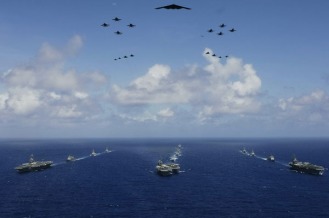Analysis of the Inter-War Period
Washington Naval Talks (1921-1922)

Between 1921 and 1922, the world's predominant naval powers gathered in Washington to discuss possible naval disarmament, as well as ways to relieve conflict in East Asia. Countries involved in this activity included: Great Britain, Japan, Italy, France, Belgium, Portugal, China, and the Netherlands. Throughout the Washington Naval Talks, three major treaties were established: the Five-Power Treaty, the Four-Power Treaty, and the Nine-Power Treaty.
The Five-Power Treaty was signed by the United States, Britain, Japan, France, and Italy which called for a fixed ratio of warship masses. United States and Britain were allowed to have a total of 500, 000 tons worth of Navy equipment, Japan allowed to have 300, 000 ton, and France and Italy each able to have 175, 000 tons of navy goods. The reason as to why United States and Britain were permitted to have more navy supplies than the other countries are because they have two oceans to manage: Atlantic Ocean, as well as the Pacific Ocean.
In the Four-Power Treaty, United States, France, Britain, and Japan agreed to negotiate with one another if crisis breaks out in East Asia again before taking action. This new treaty was a relief to the United States, because they were therefore able to stop the worrying about conflict with the Japanese and also, because the agreement states that before taking action, all of the nations in the treaty must be notified as to what is going on and a system of discussions would emerge to prevent war. This treaty replaced the Anglo-Japanese treaty in 1902 and allowed the United States to be less fearful of the heavy militarized Japan which was assured peace throughout countries.
Lastly, the Nine-Power Treaty marked the internationalization of the United States’ Open Door Policy in China. This treaty promised each country involved in the Washington Naval Talks (United States, Britain, France, Japan, Italy, Belgium, Netherlands, Portugal and China) to respect the territories of China and also established equality amongst countries which wanted to do business with China. It therefore prevented Japan from being over-dominant over China and has clearly proven successful when Japan gave back the Chinese railroad from the Shandong treaty which was signed after this Nine-Power Treaty.
The Five-Power Treaty was signed by the United States, Britain, Japan, France, and Italy which called for a fixed ratio of warship masses. United States and Britain were allowed to have a total of 500, 000 tons worth of Navy equipment, Japan allowed to have 300, 000 ton, and France and Italy each able to have 175, 000 tons of navy goods. The reason as to why United States and Britain were permitted to have more navy supplies than the other countries are because they have two oceans to manage: Atlantic Ocean, as well as the Pacific Ocean.
In the Four-Power Treaty, United States, France, Britain, and Japan agreed to negotiate with one another if crisis breaks out in East Asia again before taking action. This new treaty was a relief to the United States, because they were therefore able to stop the worrying about conflict with the Japanese and also, because the agreement states that before taking action, all of the nations in the treaty must be notified as to what is going on and a system of discussions would emerge to prevent war. This treaty replaced the Anglo-Japanese treaty in 1902 and allowed the United States to be less fearful of the heavy militarized Japan which was assured peace throughout countries.
Lastly, the Nine-Power Treaty marked the internationalization of the United States’ Open Door Policy in China. This treaty promised each country involved in the Washington Naval Talks (United States, Britain, France, Japan, Italy, Belgium, Netherlands, Portugal and China) to respect the territories of China and also established equality amongst countries which wanted to do business with China. It therefore prevented Japan from being over-dominant over China and has clearly proven successful when Japan gave back the Chinese railroad from the Shandong treaty which was signed after this Nine-Power Treaty.
